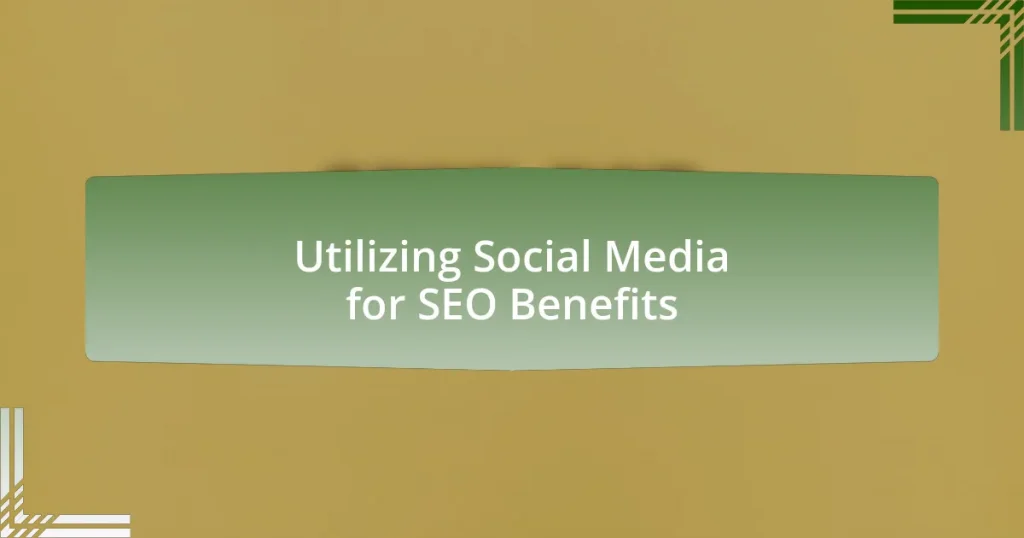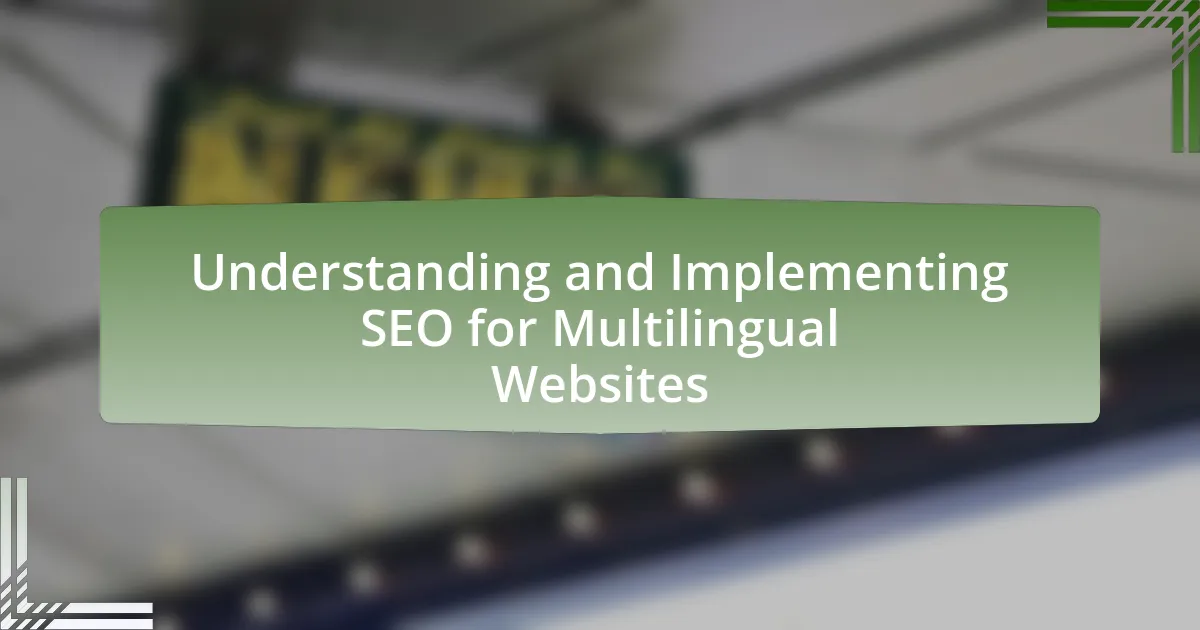Utilizing social media for SEO benefits refers to the strategic use of social media platforms to improve a website’s visibility and ranking in search engine results. The article outlines how social media can drive traffic, enhance brand awareness, and generate backlinks, all of which are essential for effective SEO. Key mechanisms discussed include the influence of social signals on search rankings, the importance of audience engagement, and best practices for integrating social media into SEO strategies. Additionally, the article addresses challenges and pitfalls businesses may encounter while leveraging social media for SEO, as well as metrics for measuring effectiveness.
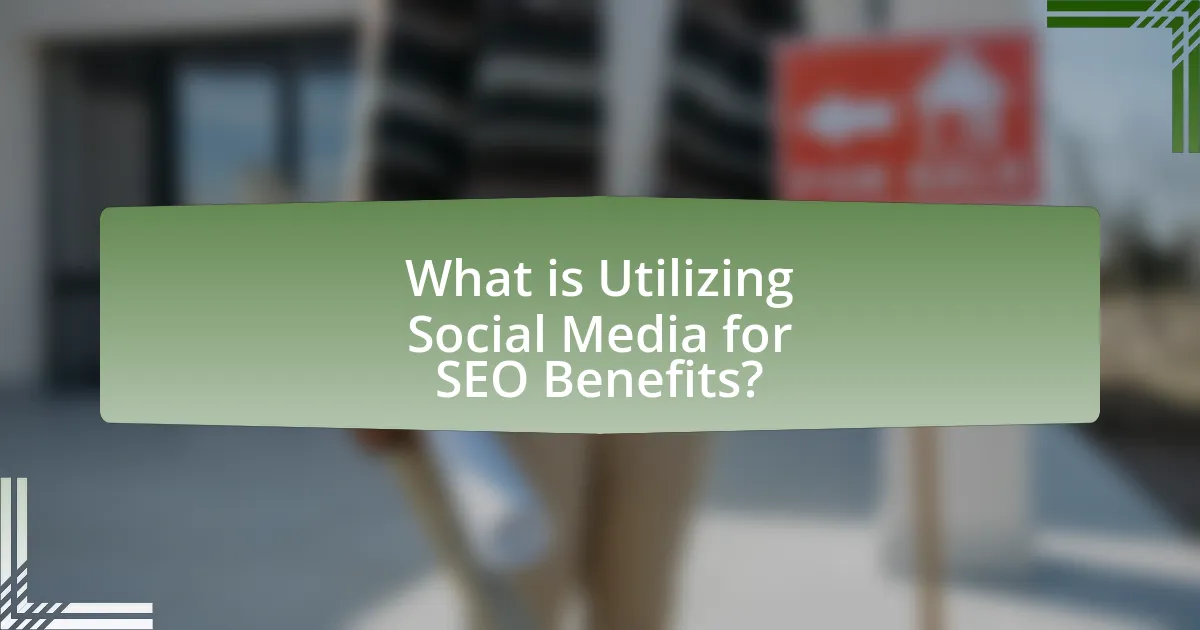
What is Utilizing Social Media for SEO Benefits?
Utilizing social media for SEO benefits involves leveraging social media platforms to enhance a website’s search engine visibility and ranking. Social media can drive traffic to a website, increase brand awareness, and generate backlinks, all of which are critical factors in SEO. For instance, a study by HubSpot found that companies that actively engage on social media see a 32% increase in their website traffic. Additionally, social signals, such as likes and shares, can indirectly influence search engine algorithms, as they indicate content relevance and popularity.
How does social media influence search engine optimization?
Social media influences search engine optimization by driving traffic to websites and enhancing brand visibility. When content is shared on social media platforms, it can lead to increased backlinks and user engagement, which are critical factors for search engine rankings. According to a study by Moz, social signals, such as likes and shares, correlate with higher search engine rankings, indicating that active social media presence can positively impact SEO performance. Additionally, content that gains traction on social media often receives more organic search traffic, further boosting its visibility in search engine results.
What are the key mechanisms through which social media impacts SEO?
Social media impacts SEO primarily through increased visibility, traffic generation, and link building. Increased visibility occurs when content shared on social media platforms reaches a broader audience, leading to higher brand awareness and potential website visits. For instance, a study by HubSpot found that social media posts can drive up to 31% of referral traffic to websites. Traffic generation is further enhanced as social media users engage with content, leading to more organic searches and direct visits to the website. Additionally, social media can facilitate link building; when content is shared widely, it is more likely to be linked back to by other websites, which is a crucial factor in Google’s ranking algorithms. According to Moz, backlinks from reputable sources significantly improve a site’s authority and search rankings. Thus, the interplay between social media engagement and SEO is evident through these mechanisms.
How do social signals affect search engine rankings?
Social signals, such as likes, shares, and comments on social media platforms, can positively influence search engine rankings by indicating content popularity and relevance. Search engines like Google consider these signals as indicators of quality and engagement, which can lead to higher visibility in search results. For instance, a study by Moz found that social signals correlate with higher search rankings, suggesting that content shared widely on social media is often perceived as more authoritative. Additionally, increased social engagement can drive traffic to websites, further enhancing their ranking potential through user interaction metrics.
Why is social media important for SEO strategies?
Social media is important for SEO strategies because it enhances online visibility and drives traffic to websites. When content is shared on social media platforms, it increases the likelihood of backlinks from other websites, which are crucial for improving search engine rankings. According to a study by HubSpot, 75% of marketers reported that social media has a positive impact on their SEO efforts. Additionally, social media profiles often rank in search engine results, providing more opportunities for brand exposure. This interconnectedness between social media engagement and SEO performance underscores the significance of integrating social media into comprehensive SEO strategies.
What advantages does social media provide for enhancing online visibility?
Social media enhances online visibility by increasing brand awareness and driving traffic to websites. Platforms like Facebook, Twitter, and Instagram allow businesses to reach a larger audience, facilitating engagement through shares, likes, and comments. According to a study by HubSpot, 54% of social media users browse these platforms to research products, indicating that active social media presence can lead to higher website visits. Additionally, social media profiles often rank in search engine results, further boosting visibility. This dual effect of direct engagement and improved search rankings underscores the significant advantages social media offers for enhancing online visibility.
How can social media engagement improve website traffic?
Social media engagement can significantly improve website traffic by driving users from social platforms directly to a website. When users interact with content on social media, such as liking, sharing, or commenting, it increases visibility and reach, leading to more potential visitors. According to a study by HubSpot, businesses that actively engage on social media see a 24% increase in website traffic compared to those that do not. Additionally, social media posts that include links to a website can generate referral traffic, which is crucial for enhancing overall site visits.
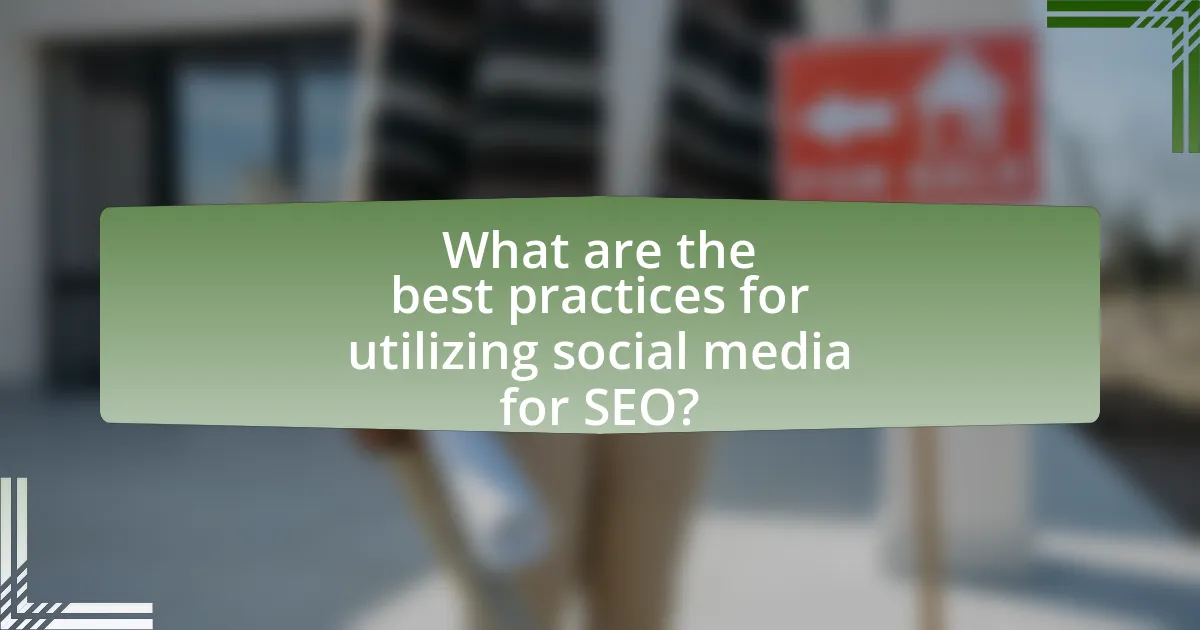
What are the best practices for utilizing social media for SEO?
The best practices for utilizing social media for SEO include creating high-quality, shareable content, engaging with your audience, optimizing social profiles, and leveraging social signals. High-quality content encourages shares and backlinks, which are crucial for SEO. Engaging with your audience fosters community and increases visibility, leading to more traffic. Optimizing social profiles with relevant keywords and links enhances discoverability. Social signals, such as likes and shares, can indirectly influence search rankings by driving traffic and increasing brand awareness. According to a study by Moz, social media presence can correlate with higher search engine rankings, demonstrating the importance of these practices.
How can businesses effectively integrate social media into their SEO efforts?
Businesses can effectively integrate social media into their SEO efforts by creating shareable content that encourages engagement and drives traffic to their websites. This strategy enhances visibility and can lead to increased backlinks, which are crucial for improving search engine rankings. For instance, a study by Moz indicates that social signals, such as shares and likes, can correlate with higher search rankings, as they indicate content relevance and popularity. Additionally, businesses should optimize their social media profiles with relevant keywords and links to their website, ensuring that search engines can index their content effectively. By consistently sharing valuable content and engaging with their audience, businesses can leverage social media to boost their overall SEO performance.
What types of content should be shared on social media to boost SEO?
To boost SEO, share content types such as blog posts, infographics, videos, and user-generated content on social media. Blog posts enhance visibility and drive traffic, as they often contain keywords that improve search rankings. Infographics simplify complex information, making it shareable and increasing backlinks, which are crucial for SEO. Videos engage users and can lead to higher retention rates, positively impacting SEO metrics. User-generated content fosters community engagement and can improve brand trust, leading to increased shares and organic reach. According to a study by HubSpot, companies that prioritize blogging are 13 times more likely to see a positive ROI, demonstrating the effectiveness of these content types in enhancing SEO through social media.
How often should businesses post on social media for optimal SEO benefits?
Businesses should post on social media at least 3 to 5 times per week for optimal SEO benefits. Regular posting helps maintain engagement and visibility, which can positively influence search engine rankings. According to a study by HubSpot, companies that post consistently on social media experience 24% more engagement than those that post infrequently. This consistent interaction can lead to increased website traffic and improved SEO performance, as search engines favor active and engaging content.
What role does audience engagement play in SEO through social media?
Audience engagement significantly enhances SEO through social media by driving traffic, increasing brand visibility, and improving search rankings. When users interact with content—such as liking, sharing, or commenting—it signals to search engines that the content is valuable and relevant, which can lead to higher rankings. According to a study by HubSpot, companies that actively engage with their audience on social media see a 50% increase in website traffic. This engagement not only boosts direct visits but also encourages backlinks and shares, further amplifying SEO efforts.
How can businesses foster community engagement on social platforms?
Businesses can foster community engagement on social platforms by actively creating and sharing relevant content that resonates with their audience. Engaging content, such as polls, questions, and user-generated content, encourages interaction and builds a sense of community. According to a study by Sprout Social, 70% of consumers feel more connected to brands with a strong social media presence, highlighting the importance of consistent engagement. Additionally, responding promptly to comments and messages fosters a two-way communication channel, further enhancing community ties.
What strategies can enhance user interaction and sharing of content?
To enhance user interaction and sharing of content, implementing engaging visuals, interactive elements, and social sharing buttons is essential. Engaging visuals, such as infographics and videos, capture attention and encourage users to share content, as studies show that posts with images receive 94% more views than those without. Interactive elements, like polls and quizzes, foster participation, leading to increased sharing; research indicates that interactive content generates twice the engagement compared to static content. Additionally, incorporating social sharing buttons prominently on content pages facilitates easy sharing, which can increase traffic by up to 700%, according to a study by the Content Marketing Institute.
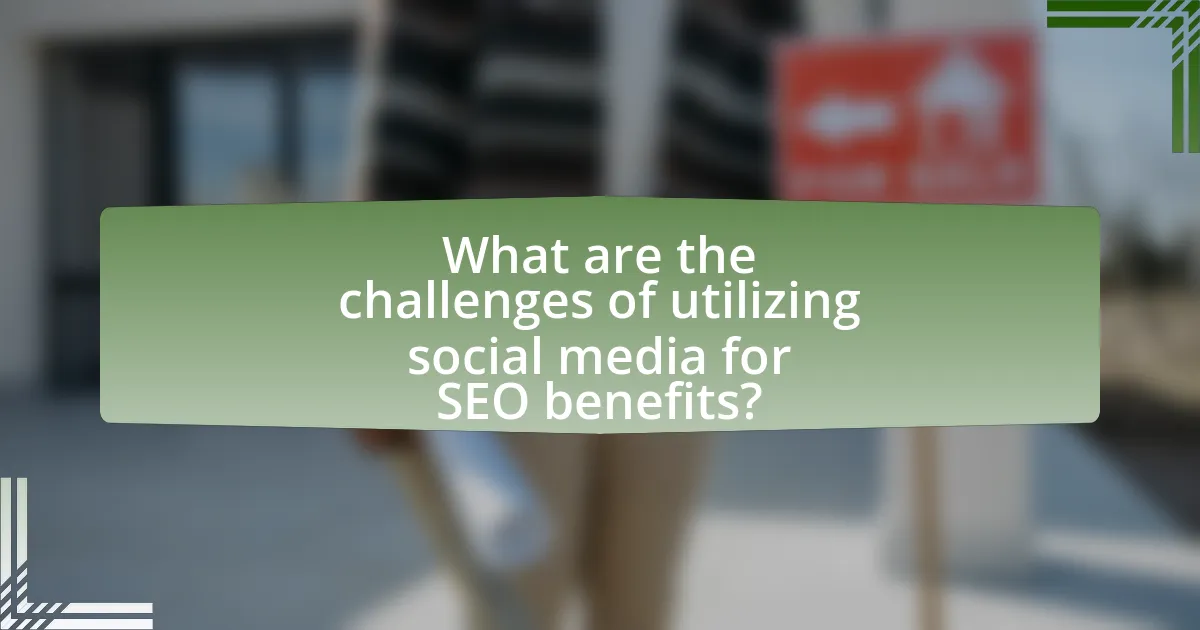
What are the challenges of utilizing social media for SEO benefits?
Utilizing social media for SEO benefits presents several challenges, including the difficulty in measuring direct impact, the need for consistent engagement, and the potential for algorithm changes. Measuring the direct impact of social media on SEO is complex, as search engines do not explicitly factor social signals into ranking algorithms, making it hard to quantify results. Additionally, maintaining consistent engagement across platforms requires significant time and resources, which can strain marketing teams. Lastly, frequent changes in social media algorithms can affect visibility and reach, complicating strategies aimed at leveraging social media for SEO.
What common pitfalls should businesses avoid when using social media for SEO?
Businesses should avoid the pitfall of neglecting engagement on social media platforms when using them for SEO. Engaging with followers through comments, shares, and direct messages enhances brand visibility and fosters community, which can lead to increased traffic and backlinks. Additionally, businesses often fail to optimize their social media profiles for search engines, missing opportunities to include relevant keywords and links that can improve their search rankings. According to a study by HubSpot, companies that actively engage on social media see a 20-40% increase in website traffic, highlighting the importance of interaction and optimization in leveraging social media for SEO benefits.
How can misinformation on social media negatively impact SEO?
Misinformation on social media can negatively impact SEO by leading to decreased trust and credibility for websites associated with false information. When users encounter misleading content, they are less likely to engage with or share links to those websites, resulting in lower traffic and reduced organic search rankings. Additionally, search engines prioritize authoritative and reliable sources; thus, if a site is linked to misinformation, it may be penalized in search results. Studies have shown that 86% of users are concerned about the accuracy of information on social media, which directly influences their online behavior and trust in linked content.
What are the risks of over-reliance on social media for SEO?
Over-reliance on social media for SEO can lead to several risks, including diminished organic search visibility and dependency on platform algorithms. When businesses prioritize social media over traditional SEO strategies, they may neglect essential practices like keyword optimization and quality content creation, which are crucial for ranking in search engines. Additionally, social media platforms frequently change their algorithms, which can result in fluctuating visibility and engagement, making businesses vulnerable to shifts beyond their control. According to a study by HubSpot, 61% of marketers say improving SEO and growing their organic presence is their top inbound marketing priority, highlighting the importance of a balanced approach that does not solely depend on social media.
How can businesses measure the effectiveness of social media on SEO?
Businesses can measure the effectiveness of social media on SEO by analyzing key performance indicators (KPIs) such as organic traffic, keyword rankings, and social engagement metrics. By using tools like Google Analytics, businesses can track the increase in organic traffic that correlates with social media campaigns, indicating a positive impact on SEO. Additionally, monitoring changes in keyword rankings after social media promotions can reveal how social signals influence search visibility. A study by Moz found that social media shares can lead to increased backlinks, which are crucial for SEO, further validating the connection between social media activity and search engine performance.
What metrics should be tracked to assess social media’s impact on SEO?
To assess social media’s impact on SEO, key metrics to track include referral traffic, social shares, engagement rates, and brand mentions. Referral traffic indicates how many visitors come to a website from social media platforms, which can enhance search engine rankings. Social shares reflect the popularity and reach of content, influencing visibility and potential backlinks. Engagement rates, such as likes, comments, and shares, demonstrate audience interaction, which can signal content quality to search engines. Brand mentions, both on social media and across the web, contribute to brand authority and can improve SEO performance by increasing visibility and credibility.
How can analytics tools help in evaluating social media performance for SEO?
Analytics tools can help evaluate social media performance for SEO by providing data on engagement metrics, audience demographics, and referral traffic. These tools, such as Google Analytics and social media insights, allow marketers to track how social media activities influence website traffic and search engine rankings. For instance, data showing increased referral traffic from social media platforms can indicate effective content sharing, which correlates with improved SEO performance. Additionally, analytics can reveal which types of content generate the most engagement, helping to refine strategies that align with SEO goals.
What are the practical tips for maximizing SEO benefits from social media?
To maximize SEO benefits from social media, businesses should focus on creating high-quality, shareable content that encourages engagement. Engaging content increases the likelihood of shares and backlinks, which are crucial for SEO. Additionally, optimizing social media profiles with relevant keywords and links to the website enhances visibility in search results. According to a study by HubSpot, companies that actively engage on social media see a 50% increase in website traffic. Furthermore, using social media to promote blog posts and other content can drive referral traffic, which positively impacts search rankings.
